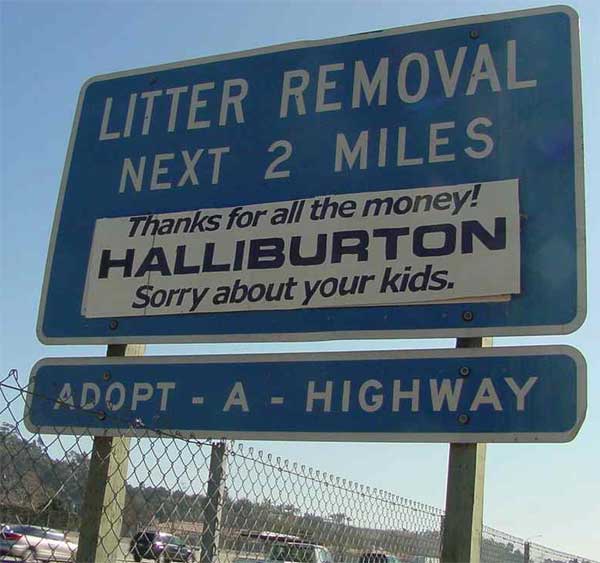- Posts: 3975
- Thank you received: 14
Regulation Lax as Gas Wells’ Tainted Water Hits Rivers
- Photo-fish
-
 Topic Author
Topic Author
- Mountain Legend
-

http://www.nytimes.com/2011/02/27/us/27gas.html?_r=1
The documents reveal that the wastewater, which is sometimes hauled to sewage plants not designed to treat it and then discharged into rivers that supply drinking water, contains radioactivity at levels higher than previously known, and far higher than the level that federal regulators say is safe for these treatment plants to handle.
Other documents and interviews show that many E.P.A. scientists are alarmed, warning that the drilling waste is a threat to drinking water in Pennsylvania. Their concern is based partly on a 2009 study, never made public, written by an E.P.A. consultant who concluded that some sewage treatment plants were incapable of removing certain drilling waste contaminants and were probably violating the law.
The Times also found never-reported studies by the E.P.A. and a confidential study by the drilling industry that all concluded that radioactivity in drilling waste cannot be fully diluted in rivers and other waterways.
http://frackaction.com/fracking-in-colorado
´¯`•.. ><((((º>`•´¯`•...¸><((((º> ´¯`•.. ><((((º>`´¯`•...¸><((((º>´¯`•.. ><((((º>`•´¯`•...¸><((((º> ´¯`•.. ><((((º>`•.´¯`•...¸><((((º>
Please Log in or Create an account to join the conversation.
- FredHayek
-

- Mountain Legend
-

- Posts: 30200
- Thank you received: 178
Imagine those poor people who choose to live in New Orleans, a whole continent drains into their town and they live below sea level.
Thomas Sowell: There are no solutions, just trade-offs.
Please Log in or Create an account to join the conversation.
- PrintSmith
-

- Mountain Legend
-

- Posts: 5692
- Thank you received: 40
Please Log in or Create an account to join the conversation.
- Photo-fish
-
 Topic Author
Topic Author
- Mountain Legend
-

- Posts: 3975
- Thank you received: 14
Gas Drilling Contaminated Texas Water Wells, EPA Says
http://www.newsinferno.com/fracking/fracker-contaminated-texas-water-wells-epa-says/
EPA releases results of Wyoming water well testing
http://articles.cnn.com/2010-08-31/us/wyoming.epa.water_1_drinking-water-epa-safe-water?_s=PM:US
Marcellus Shale gas drillers committed 1,435 violations in 2.5 years, report says
http://www.pennlive.com/midstate/index.ssf/2010/08/marcellus_shale_gas_drillers_c.html
Drilling Around the Law
http://www.ewg.org/drillingaroundthelaw
And aside from the clean water opinion/facts/debate:
http://www.newsinferno.com/health-concerns/truck-traffic-a-big-issue-in-fracking-debate/
Look at who is funding the facts for 'pro'-Hydrofracking and all of it is paid for my the gas companies. While so much that is Anti-hydrofracking is from independent sources. The EPA in NY State had even admitted they didn't know anything about hydrofracking and had taken the word of the drilling industry when they say it is safe. Is that what we want our Government to do to protect us?
Why are the chemicals that are pumped into the ground kept such a secret? Why shouldn't this be fully disclosed?
How much risk of pollution are we willing to accept in order to obtain a natural resource needed by our society?
Sorry if you don't like this opinion piece called the Halliburton Loophole.
http://www.nytimes.com/2009/11/03/opinion/03tue3.html
Among the many dubious provisions in the 2005 energy bill was one dubbed the Halliburton loophole, which was inserted at the behest of — you guessed it — then-Vice President Dick Cheney, a former chief executive of Halliburton.
´¯`•.. ><((((º>`•´¯`•...¸><((((º> ´¯`•.. ><((((º>`´¯`•...¸><((((º>´¯`•.. ><((((º>`•´¯`•...¸><((((º> ´¯`•.. ><((((º>`•.´¯`•...¸><((((º>
Please Log in or Create an account to join the conversation.
- Rockdoc
-

- Mountain Legend
-

I can say this about hydrofracing; the artificial development of fractures in a particular formation does not extend that far from a borehole. The process is also not limited to gas wells, but also includes water and oil wells. Potable drinking water rarely exists below a few thousand feet because it becomes too saline (the amount of dissolved salts and leached metals becomes too great). Gas wells rarely are less than 1000 feet in depth, most being tens of thousands of feet in depth. Hydrofracing in gas wells is focused on the productive intervals, much like it is in water wells. Hence, contamination of potable water reservoirs is rare unless hydrofractures intersect faults that extend into the aquifer. Other factors associated with drilling HC wells may also come into play when aquifers become contaminated. I can elaborate if you wish.
First, let me know if I've gone off the deep end.
Please Log in or Create an account to join the conversation.
- Photo-fish
-
 Topic Author
Topic Author
- Mountain Legend
-

- Posts: 3975
- Thank you received: 14
Rockdoc Franz wrote: Photo-fish, You have established there are some instances where drinking water has become contaminated as a result of hydrocarbon production. If I get the gist of your insinuated argument correctly, are you saying that hydrofracturing is the sole or major cause?
I can say this about hydrofracing; the artificial development of fractures in a particular formation does not extend that far from a borehole. The process is also not limited to gas wells, but also includes water and oil wells. Potable drinking water rarely exists below a few thousand feet because it becomes too saline (the amount of dissolved salts and leached metals becomes too great). Gas wells rarely are less than 1000 feet in depth, most being tens of thousands of feet in depth. Hydrofracing in gas wells is focused on the productive intervals, much like it is in water wells. Hence, contamination of potable water reservoirs is rare unless hydrofractures intersect faults that extend into the aquifer. Other factors associated with drilling HC wells may also come into play when aquifers become contaminated. I can elaborate if you wish.
First, let me know if I've gone off the deep end.
I was hoping that you would respond to this, thank you. I am still learning quite a bit...
I am not saying that the act of hydrofracking for gas 'mining' is contaminating the wells as a sole or major cause. I am pointing out the undocumented, untested and unknown chemicals in the slurry that they use. (I doubt anyone would use it for water wells.) It does not all come back out does it? Couldn't what is left down there migrate after the gas is depleted? And what becomes of the toxic slurry that does come back out? It is often not fully contained and gets spilled on site with inadequate if any BMPs in place.
Then there is the problem of disposing it or trying to treat it enough to become wastewater effluent in our nations watersheds. Good luck finding many WWTPs that are permitted and advanced enough to remove it, that is if they even know what they are treating. Secret slurry recipes prolly won't be fully divulged to a treatment plant if they won't even tell the EPA.
As you have said that the fractures from the hydrofracking do not extend far from the boreholes, one must also take into consideration the existance of natural cracks and fissures in the bedrock that is being bored through. They were already there and now become conduits for the slurry. Further, if there is no gas present in these existing cracks and fissures then how will the slurry be extracted?
I monitor snowpack and stream flows as part of my job and I am seriously worried about the future, this summer in particular. Although some would say that we have enough water to suit our current needs, the day WILL come when we will need to tap into those deep saline aquifers and treat it for drinking and other purposes. Why risk polluting it with unknown chemicals?
´¯`•.. ><((((º>`•´¯`•...¸><((((º> ´¯`•.. ><((((º>`´¯`•...¸><((((º>´¯`•.. ><((((º>`•´¯`•...¸><((((º> ´¯`•.. ><((((º>`•.´¯`•...¸><((((º>
Please Log in or Create an account to join the conversation.
- Rockdoc
-

- Mountain Legend
-

I doubt that taping into deep saline aquifers is the way to go for future drinking water. The dissolved radioactive materials, sulfur and other minerals are far more concentrated than that found in sea water. Population increases certainly will make potable water a limited resource and thus a valuable commodity, one much more so than it is today. Many will be forced to buy all their water needs, some will exploit deeper saline aquifers (like is happening here in the mountains already and you know that that water is foul) and will need to incorporate elaborate and expensive filtration systems, others will no doubt invest in other yet undeveloped technology that perhaps will be an outgrowth of hydrogen combustion. You are right. Water will be an increasingly greater problem in the future, but personally, I do not see drilling for gas or oil and associated hydrofracturing as a major issue. Namely, most hydrocarbon wells are much deeper than 1000 feet, and if they are not, then the associated water is already contaminated naturally by the hydrocarbons and the collated radioactive materials fixed by organic matter.
Please Log in or Create an account to join the conversation.








